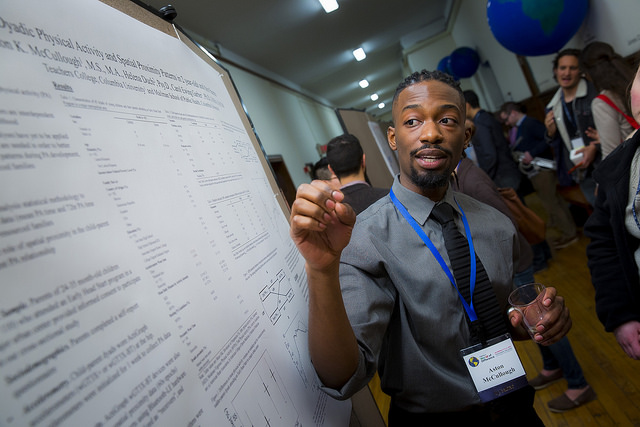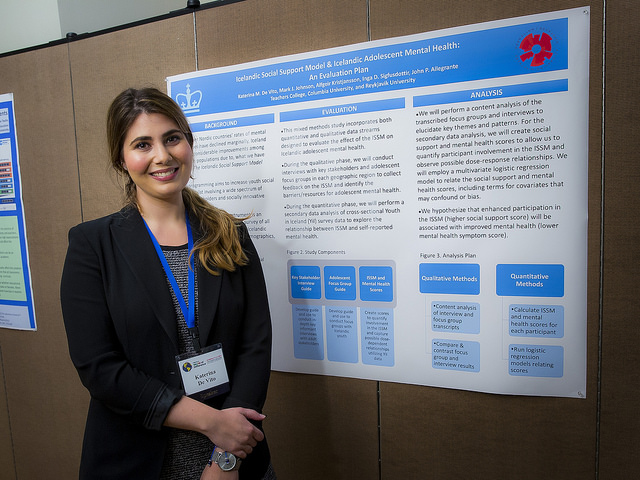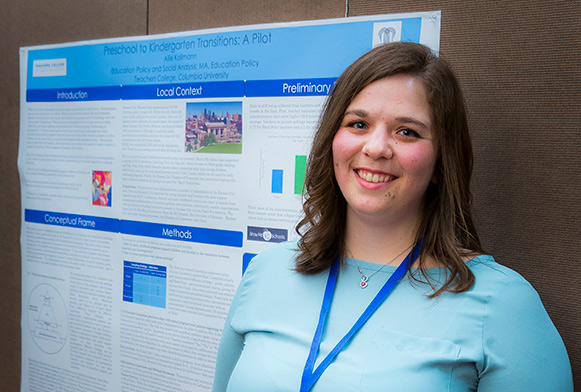Part of the Festival: A Celebration of TC Student Work

This year’s winner (and recipient of a prize of one tuition credit) was Kate Russell, a master’s student in Counseling & Clinical Psychology.
Russell’s poster was titled “A proposed adaptation of interpersonal psychotherapy (IPT-G) for lesbian, gay, bisexual, transgender and questioning (LGBTQ) youth and in emerging adulthood with role transition or interpersonal dispute problem areas.”
Her abstract read: For LGBTQ youth and in emerging adulthood, higher rates of depression and suicidality exist as compared to their heterosexual, cisgendered cohorts. Current literature indicates that the explanation behind these inequities lies in unique minority stress, societal attitudes that pervade into the healthcare system, and victimization specific to the LGBTQ population. Given economic considerations that disproportionately effect the LGBTQ community and the emergent nature of the health issues, a time-limited, evidence based psychotherapy for depression that is highly adaptable is proposed to fill the treatment gap and foster resilience. An adaptation of IPT-G is outlined and a pilot study to utilize it is proposed.
“I love children and technology. The show will be a fun way for girls to take an interest in computer coding -- and perhaps it will help improve gender equity in STEM fields, especially in computer science.” —Lauren Slusser, master's degree student in Cognitive Studies in Education
The “People's Choice” presentation (as voted on by attendees at the session) was by Melissa Arnold Lyon and Iris Daruwala, both Ph.D. students in the Department of Education Policy and Social Analysis.
Their presentation was titled “The Effect of State Takeover on Suspension Rates in Tennessee.”
Their abstract read: The proliferation of state intervention proposals across the country necessitates reliable information about the effects of performance-based state takeovers like the Achievement School District in Tennessee. Therefore, in this study we use quasi-experimental causal inference techniques to address the question: To what extent does the state takeover of low performing schools through the Tennessee Achievement School District cause changes in student suspension rates? Our findings suggest that ASD takeover does not dramatically affect and could potentially lower punitive disciplinary measures like suspension rates.

The mental health of adolescents in Iceland (Katerina De Vito, doctoral student in health education)
In her doctoral dissertation, De Vito, who has a master’s degree in public health from Harvard, is trying to learn more about why teens in Iceland have fewer mental health problems and less instances of substance abuse than their European peers. She will evaluate two decades of data and spend nine months in Iceland’s capital, Reykjavik. Funded by a prestigious Fulbright entScholarship, she’ll interview teachers, counselors, parents and coaches. Her going-in hypothesis: teens benefit from Iceland’s strong support systems. But “whatever they are doing right to lower mental health problems and substance abuse, I’ll bring back with me, and I hope we can use the findings to help America’s adolescents became happier and healthier.”
The transition from pre-K to kindergarten (Allie Kallmann, master’s student in Education Policy)
The transition from pre-K to kindergarten is a critical time when the foundations are laid for literacy, quantitative skills and social and emotional development. Yet many children struggle.

Do Active Parents Raise Active Children? (Aston K. McCullough, doctoral student in Movement Sciences)
Are children more active if they spend a lot of time in close proximity to physically active parents? Do they grow up to be physically active adults, even after they’ve left home? Because physical activity is related to health, these questions are important to people who are interested in how to raise healthy babies, children and adults.
They were questions that Aston K. McCullough, a dancer and Ph.D. and M.Phil. candidate in Kinesiology in the Department of Biobehavioral Sciences, wanted to answer in his study, “Dyadic patterns of physical activity and spatial proximity in 2 year-olds and their parents,” which he presented at the poster session at Academic Festival.
Prior research suggests that parents influence the amount of their children’s physical activity, even beyond childhood. With Helena Duch of the Mailman School of Public Health, Columbia University; and Carol Ewing Garber, Ph.D., professor of movement sciences at Teachers College, McCullough studied 110 child-parent pairs at an Early Head Start center in a major urban center.
He found role (i.e., child vs. parent) and gender differences among the pairs of predominantly Latino mothers and their toddlers. For example, the more time mothers spent in proximity (defined as 10 meters) to their children, the less active the children were, even as child-mother activity behaviors remained interdependent. By the time children reach age two, sedentary behaviors are interdependent in boy-and-parent, but not girl-and-parent pairs, suggesting important gender differences in child-and-parent behavioral interdependencies even in very young children.
”Our study uncovers a need to further understand developmental, socio-behavioral, cultural, and environmental factors that might further explain these differences,” McCullough writes.
Teaching computer coding to girls (Lauren Slusser master’s student in Cognitive Studies in Education)
Slusser, whose concentration is in Children's Media Analysis & Evaluation, is creating a TV show to help pre-school aged girls learn how to code. Currently in storyboard form, the show, Jo & Sparks Electric Playhouse, the show will be focused on “Scratch,” a visual programming language that uses icons and puzzle pieces that fit together. Slusser also is picking up pointers for the show from her internship at a Manhattan kindergarten.
Before coming to TC, Slusser worked at Nickelodeon Animation Studios in Los Angeles, most recently as Post Production Manager on the preschool series Dora the Explorer. She graduated from UCLA, where she majored in Film, Television, & Digital Media.
“I love children and technology,” she says. “The show will be a fun way for girls to take an interest in computer coding -- and perhaps it will help improve gender equity in STEM fields, especially in computer science.”
— Robert Florida and Patricia Lamiell
Related Stories
Honoring Alumni Who Educate for Social Justice
Published Wednesday, Apr 12, 2017